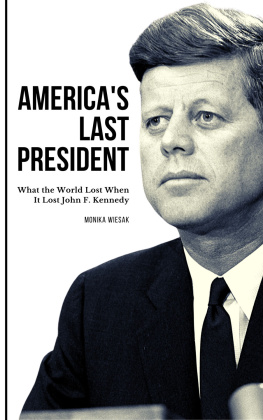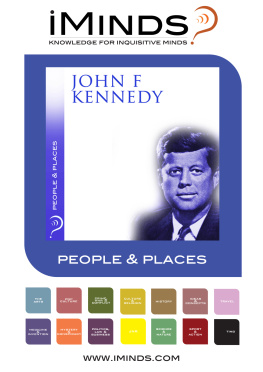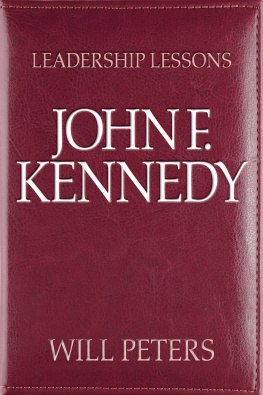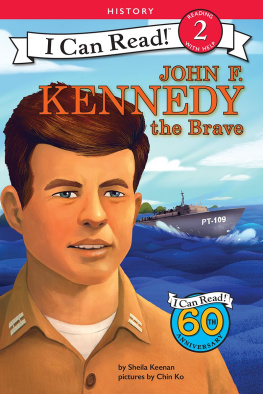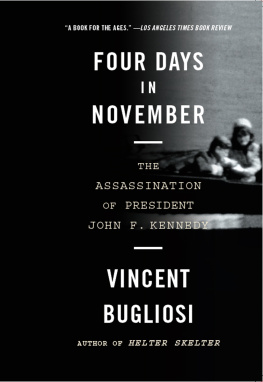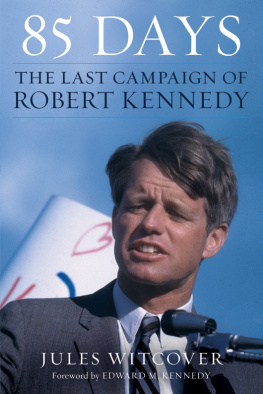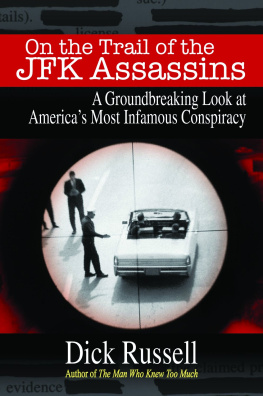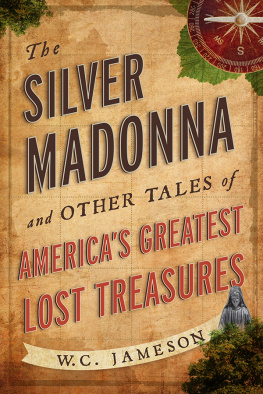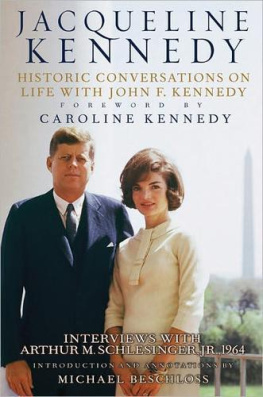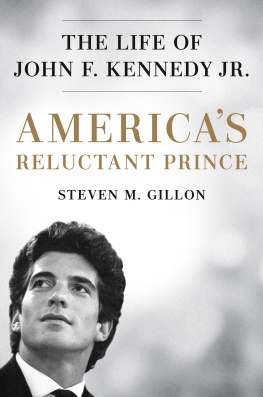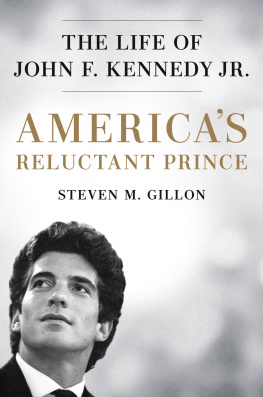Monika Wiesak - Americas Last President: What the World Lost When It Lost John F. Kennedy
Here you can read online Monika Wiesak - Americas Last President: What the World Lost When It Lost John F. Kennedy full text of the book (entire story) in english for free. Download pdf and epub, get meaning, cover and reviews about this ebook. year: 2022, publisher: Monika Wiesak, genre: Politics. Description of the work, (preface) as well as reviews are available. Best literature library LitArk.com created for fans of good reading and offers a wide selection of genres:
Romance novel
Science fiction
Adventure
Detective
Science
History
Home and family
Prose
Art
Politics
Computer
Non-fiction
Religion
Business
Children
Humor
Choose a favorite category and find really read worthwhile books. Enjoy immersion in the world of imagination, feel the emotions of the characters or learn something new for yourself, make an fascinating discovery.
- Book:Americas Last President: What the World Lost When It Lost John F. Kennedy
- Author:
- Publisher:Monika Wiesak
- Genre:
- Year:2022
- Rating:4 / 5
- Favourites:Add to favourites
- Your mark:
- 80
- 1
- 2
- 3
- 4
- 5
Americas Last President: What the World Lost When It Lost John F. Kennedy: summary, description and annotation
We offer to read an annotation, description, summary or preface (depends on what the author of the book "Americas Last President: What the World Lost When It Lost John F. Kennedy" wrote himself). If you haven't found the necessary information about the book — write in the comments, we will try to find it.
Monika Wiesak: author's other books
Who wrote Americas Last President: What the World Lost When It Lost John F. Kennedy? Find out the surname, the name of the author of the book and a list of all author's works by series.
Americas Last President: What the World Lost When It Lost John F. Kennedy — read online for free the complete book (whole text) full work
Below is the text of the book, divided by pages. System saving the place of the last page read, allows you to conveniently read the book "Americas Last President: What the World Lost When It Lost John F. Kennedy" online for free, without having to search again every time where you left off. Put a bookmark, and you can go to the page where you finished reading at any time.
Font size:
Interval:
Bookmark:
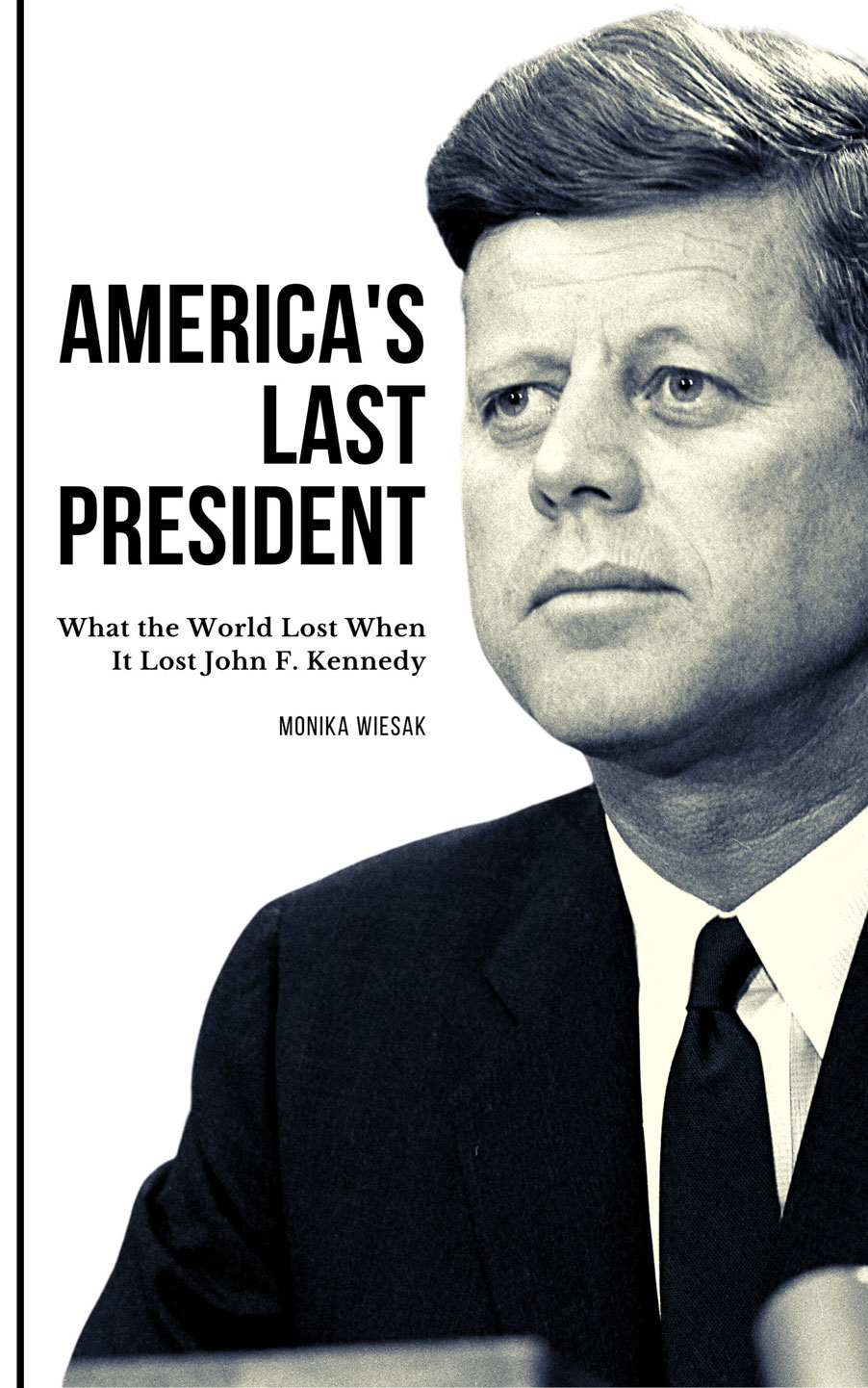

Copyright 2022 by Monika Wiesak
All rights reserved. No part of this publication may be reproduced, stored or transmitted in any form or by any means, electronic, mechanical, photocopying, recording, scanning, or otherwise without written permission from the publisher. It is illegal to copy this book, post it to a website, or distribute it by any other means without permission.
First edition
This book was professionally typeset on Reedsy
Find out more at reedsy.com
To
John F. Kennedy and Robert F. Kennedy
May your spirit live on eternally
To
Robert F. Kennedy Jr.
You embody the essence of your father and uncle
To
My Mother
You gave me your passion for history
To
Future Generations
May you always know your true history
A man may die, nations may rise and fall, but an idea lives on. Ideas have endurance, without death.
John F. Kennedy
In recent years I have become more and more aware of how concentrated power is. I began to wonder whether it had always been this way. And if not, when did it change? Was there an inflection point? Why did it seem like corporations and private interests were driving decisions impacting the entire globe? Why did it seem like we no longer lived in a democracy? Or had democracy died long ago, and it was just an illusion maintained? And most important of all, was there a better way?
Certainly, more than one historical event led us to this moment. After all, history is a summation of many acts that together create our present world. As such, history is never obsolete, and it is not random. Historical events do not sit in isolation and are not detached from today. Rather, history is linear. It takes us down a particular course that leads us to the present. Some moments in history have more impact on the direction of that course than others. And some can drastically alter it. Returning to those moments can teach us much about finding our way onto a better path. In this authors view, one of the most important historical events that led us down this road of dying democracy and globalist imperialist control was the loss of John F. Kennedy, followed by the loss of his brother Robert F. Kennedy.
As a child, I was always perplexed about who John F. Kennedy was. Clips of him speaking evoked in me a childlike intuition that he was a good person, a great leader, but then I heard press stories about endless affairs, mob dealings, and Castro assassination attempts. I had the impression that all he did while at the White House was sleep around and plot Castros death. And the only reason he made it to the White House was because his father bought him the election, and the mob rigged some votes, or so the story goes. It did not occur to me that there might be a deliberate propaganda campaign to paint him in a superficial and negative light. I did not even understand what propaganda was. I did not think about it much, but any time his name came up, I wondered, who was this guy? And why did he seem so contradictory? Was he simply a complex figure like the rest of us, but on a grander scale? I wanted to understand more, so one day, as an adult, I picked up a biography on JFK. Unfortunately, that book did not help me understand him better; in fact, it portrayed the same contradictory popular culture image I had seen on TV. But with time, I began to delve deeper and eventually fell down the proverbial rabbit hole in my quest for the truth.
The more I learned about his policies, his challenges, his leadership style, and, more than anything, his courage, the more impressed I became. I realized that the public image of him as a careless, thoughtless, self-involved playboy obscured the depth of what he was trying to achieve and the intensity of opposition he faced. I felt cheated out of understanding our true history and, as an extension, out of understanding the world around me.
This book came from my desire to share what I had learned, give another perspective on the man, and explain why his presidency is so important to our world today. His untimely death has had such catastrophic long-term consequences for our society, consequences we are living with now. Our world needs so much healing and understanding the presidency and premature loss of John F. Kennedy can help give us a starting point where we can find that healing. It can provide us with a microcosm through which we can better understand the macrocosm of our world. This book delves into what started to be and what could have been, and if we so desire, what could still be. Let us resolve to be the masters, not the victims of our history, JFK once said.
The study of John F. Kennedys presidency reveals certain repeating themes: anti-colonialism, anti-imperialism, self-determination, nationalism, the alleviation of poverty and suffering, opportunity for all, cooperation, understanding, peace, checks on corruption and powerful private interests, constant questioning, and more than anything, a love for humanityall of humanity. These themes are sorely missing in todays world of empire, greed, division, globally dictated policies, technocracy, censorship, ever-increasing wealth gaps, endless wars, and unbridled corruption.
We must recapture the spirit and reclaim the courage that this man represented. As JFK once said, A man may die, nations may rise and fall, but an idea lives on. Ideas have endurance, without death. In light of this truth, the merciless, endless character assassinationwhat some call the posthumous assassination of JFKmakes sense. In his song Murder Most Foulthe title a reference to Shakespeares Hamlet, in which Hamlets father, the slain king, comes back to tell his son his death is not what it seems, that he was indeed murdered by the current kingBob Dylan writes of Kennedy, They killed him once, and they killed him twice. It was not enough for John F. Kennedy to die. His ideas had to die with him.
In his novel 1984, George Orwell wrote, Who controls the past controls the future. Who controls the present controls the past. The essence of John F. Kennedy had to be erased, for it spoke out against the growing imperial forces of our world, forces that are now suffocating us. If we want a better future for ourselves, we need to start by genuinely understanding our past and how we arrived at the present. Only then can we recapture a better path for our future, a path that John F. Kennedy gave his life trying to forge. We cannot bring him back to life, but we can bring his ideas back to life. Those ideas have been suppressed for far too long. Let us shine a light on them, learn from him and forge a better and more just path for our future.
Our government was founded on the essential religious idea of integrity of the individual.
John F. Kennedy
Before we delve into John F. Kennedys presidency, we need to understand his frame of mind as he embarked on that historic task. Let us start by examining some of the ideals he espoused in his early years through his senatorial years. This will give us greater context behind his later actions as president.
He had a unique perspective of the world that varied greatly from the power structure of that time and even more greatly from the power structure of today. However, it aligned closely with the ideals that America purports but never lives up to. He was, in many ways, the epitome of the American ideal.
Font size:
Interval:
Bookmark:
Similar books «Americas Last President: What the World Lost When It Lost John F. Kennedy»
Look at similar books to Americas Last President: What the World Lost When It Lost John F. Kennedy. We have selected literature similar in name and meaning in the hope of providing readers with more options to find new, interesting, not yet read works.
Discussion, reviews of the book Americas Last President: What the World Lost When It Lost John F. Kennedy and just readers' own opinions. Leave your comments, write what you think about the work, its meaning or the main characters. Specify what exactly you liked and what you didn't like, and why you think so.

